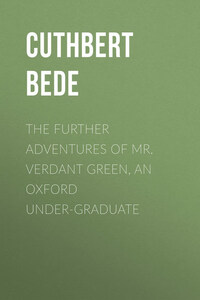CHAPTER I.
MR. VERDANT GREEN RECOMMENCES HIS EXISTENCE AS AN OXFORD UNDERGRADUATE
The intelligent reader – which epithet I take to be a synonym for every one who has perused the first part of the Adventures of Mr. Verdant Green, – will remember the statement, that the hero of the narrative "had gained so much experience during his Freshman's term, that, when the pleasures of the Long Vacation were at an end, and he had returned to Brazenface with his firm and fast friend Charles Larkyns, he felt himself entitled to assume a patronising air to the Freshmen, who then entered, and even sought to impose upon their credulity in ways which his own personal experience suggested." And the intelligent reader will further call to mind the fact that the first part of these memoirs concluded with the words – "it was clear that Mr. Verdant Green had made his farewell bow as an Oxford Freshman."
But, although Mr. Verdant Green had of necessity ceased to be "a Freshman" as soon as he had entered upon his second term of residence, – the name being given to students in their first term only, – yet this necessity, which, as we all know, non habet leges, will occasionally prove its rule by an exception; and if Mr. Verdant Green was no longer a Freshman in name, he still continued to be one by nature. And the intelligent reader will perceive when he comes to study these veracious memoirs, that, although their hero will no longer display those peculiarly virulent symptoms of freshness, which drew towards him so much friendly sympathy during the earlier part of his University career, yet that he will still, by his innocent simplicity and credulity, occasionally evidence the truth of the Horatian maxim, —
"Quo semel est imbuta recens, servabit odorem
which, when Smart-ly translated, means, "A cask will long preserve the flavour, with which, when new, it was once impregnated;" and which, when rendered in the Saxon vulgate, signifieth, "What is bred in the bone will come out in the flesh."
It would, indeed, take more than a Freshman's term, – a two months' residence in Oxford, – to remove the simple gaucheries of the country Squire's hobbodehoy, and convert the girlish youth, the pupil of that Nestor of Spinsters, Miss Virginia Verdant, into the man whose school was the University, whose Alma Mater was Oxonia herself. We do not cut our wise teeth in a day; some people, indeed, are so unfortunate as never to cut them at all; at the best, two months is but a brief space in which to get through this sapient teething operation, a short time in which to graft our cutting on the tree of Wisdom, more especially when the tender plant happens to be a Verdant Green. The golden age is past when the full-formed goddess of Wisdom sprang from the brain of Jove complete in all her parts. If our Vulcans now-a-days were to trepan the heads of our Jupiters, they would find nothing in them! In these degenerate times it will take more than one splitting headache to produce our wisdom.
So it was with our hero. The splitting headache, for example, which had wound up the pleasures of Mr. Small's "quiet party," had taught him that the good things of this life were not given to be abused, and that he could not exceed the bounds of temperance and moderation without being made to pay the penalty of the trespass. It had taught him that kind of wisdom which even "makes fools wise;" for it had taught him Experience. And yet, it was but a portion of that lesson of Experience which it is sometimes so hard to learn, but which, when once got by heart, is like the catechism of our early days, – it is never forgotten, – it directs us, it warns us, it advises us; it not only adorns the tale of our life, but it points the moral which may bring that tale to a happy and peaceful end.
Experience! Experience! What will it not do? It is a staff which will help us on when we are jostled by the designing crowds of our Vanity Fair. It is a telescope that will reveal to us the dark spots on what seemed to be a fair face. It is a finger-post to show us whither the crooked paths of worldly ways will lead us. It is a scar that tells of the wound which the soldier has received in the battle of life. It is a lighthouse that warns us off those hidden rocks and quicksands where the wrecks of long past joys that once smiled so fairly, and were loved so dearly, now lie buried in all their ghastliness, stripped of grace and beauty, things to shudder at and dread. Experience! Why, even Alma Mater's doctors prescribe it to be taken in the largest quantities! "Experientia —dose it!" they say: and very largely some of us have to pay for the dose. But the dose does us good; and (for it is an allopathic remedy), the greater the dose, the greater is the benefit to be derived.
The two months' allopathic dose of Experience, which had been administered to Mr. Verdant Green, chiefly through the agency of those skilful professors, Messrs. Larkyns, Fosbrooke, Smalls, and Bouncer, had been so far beneficial to him, that, in the figurative Eastern language of the last-named gentleman, he had not only been "sharpened up no end by being well rubbed against University bricks," but he had, moreover, "become so considerably wide-awake, that he would very soon be able to take the shine out of the old original Weazel, whom the pages of History had recorded as never having been discovered in a state of somnolence."








